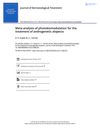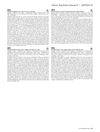15 citations,
January 2019 in “Lasers in surgery and medicine” Home-use light devices can significantly reduce hair but are less effective on very dark skin and slower than professional devices.
 28 citations,
December 2017 in “Lasers in Medical Science”
28 citations,
December 2017 in “Lasers in Medical Science” Monochromatic light devices, especially the 308-nm excimer laser, are promising for treating alopecia areata but more research is needed.
 June 2020 in “Journal of Investigative Dermatology”
June 2020 in “Journal of Investigative Dermatology” More research with diverse participants is needed to determine the effectiveness of photobiomodulation devices for hair loss treatment.
27 citations,
November 2010 in “JDDG Journal der Deutschen Dermatologischen Gesellschaft” New laser therapies are effective for skin damage, hair removal, and fat reduction.
 10 citations,
November 2019 in “Journal of Dermatological Treatment”
10 citations,
November 2019 in “Journal of Dermatological Treatment” Photobiomodulation helps hair growth safely in men and women, with laser devices working better than LED ones.
February 2022 in “INTERNATIONAL JOURNAL OF SCIENTIFIC RESEARCH” Home-based laser devices are effective for hair removal, skin rejuvenation, and stimulating hair growth, but more research is needed on their safety and long-term effects.
82 citations,
May 2005 in “Dermatologic therapy” Laser hair removal has advanced to effectively reduce hair for various skin types and hair colors.
 24 citations,
March 2015 in “Dermatologic Surgery”
24 citations,
March 2015 in “Dermatologic Surgery” Home-use cosmetic laser and light devices show modest results for hair removal and acne treatment, but more research is needed for confirmation.
 2 citations,
August 2014 in “PubMed”
2 citations,
August 2014 in “PubMed” Low-level laser or light devices could be a cheaper, side-effect free treatment for hair loss, but more research is needed to confirm their effectiveness.
9 citations,
November 2021 in “PubMed” FDA-approved low-level light/laser therapy devices can significantly increase hair density in people with pattern hair loss.
 19 citations,
September 2011 in “Seminars in Cutaneous Medicine and Surgery”
19 citations,
September 2011 in “Seminars in Cutaneous Medicine and Surgery” At-home laser and light skin devices are less effective than professional ones, with limited scientific evaluation, but some show promise for wrinkles, hair growth, and acne.
 September 2023 in “Journal of The American Academy of Dermatology”
September 2023 in “Journal of The American Academy of Dermatology” People were generally happy with the home light therapy devices for hair loss.
 9 citations,
May 2021 in “Archives of Dermatological Research”
9 citations,
May 2021 in “Archives of Dermatological Research” Home-based skin care devices are generally safe and effective for hair removal, promoting hair growth, treating wrinkles and acne, but results for psoriasis treatment are mixed.
 60 citations,
December 2015 in “Lasers in Medical Science”
60 citations,
December 2015 in “Lasers in Medical Science” Low-level laser therapy is safe and can increase hair growth for male and female pattern hair loss.
1 citations,
March 2020 in “Hair transplant forum international” The HairMeasure device is a cheap way to measure Hair Mass Index and find scalp areas for hair exams.
 13 citations,
December 2017 in “Journal of Cosmetic and Laser Therapy”
13 citations,
December 2017 in “Journal of Cosmetic and Laser Therapy” Low-level laser therapy can stimulate hair growth more effectively than fake devices, but patient satisfaction is similar for both. Results should be taken with caution due to small study sizes and differences between studies. More research is needed.
143 citations,
January 2013 in “Dermatologic surgery” In-office laser hair removal works well long-term, especially Nd:YAG for darker skin, but home devices need more testing.
 207 citations,
January 2011 in “Dermatologic Therapy”
207 citations,
January 2011 in “Dermatologic Therapy” Laser hair removal is the most requested cosmetic procedure and has become a scientifically-based treatment suitable for all skin types.
 262 citations,
May 2017 in “Nanomedicine”
262 citations,
May 2017 in “Nanomedicine” New nanofiber technology improves wound healing by supporting cell growth and delivering treatments directly to the wound.
 June 2020 in “Journal of Investigative Dermatology”
June 2020 in “Journal of Investigative Dermatology” FDA-cleared devices often fail to produce high-quality platelet-rich plasma consistently.
 32 citations,
July 2011 in “Facial Plastic Surgery”
32 citations,
July 2011 in “Facial Plastic Surgery” New hair transplant methods offer more natural results and better graft survival, with ongoing research to increase donor hair options.
 32 citations,
September 2016 in “Dermatologic Surgery”
32 citations,
September 2016 in “Dermatologic Surgery” The evidence for using Low-Level Laser Therapy for hair loss is limited and more thorough research is needed.
 2 citations,
March 2019 in “Lasers in surgery and medicine”
2 citations,
March 2019 in “Lasers in surgery and medicine” Higher light doses cause more damage to hair follicles, predicting better hair removal results.
 July 2016 in “British Journal of Dermatology”
July 2016 in “British Journal of Dermatology” The book provides an overview of new trends and techniques in cosmetic dermatology.
 75 citations,
January 2011 in “Plastic and Reconstructive Surgery”
75 citations,
January 2011 in “Plastic and Reconstructive Surgery” The dermal regeneration template is effective in skin regeneration, reducing scarring, and has potential for future improvements.
3 citations,
December 2014 in “Aesthetic dermatology” Radiofrequency is effective for noninvasive wrinkle treatments and body contouring.
 January 2023 in “Dermatologic Therapy”
January 2023 in “Dermatologic Therapy” A new hand-held light therapy device was found to be safe and effective for treating mild-to-moderate acne.
 46 citations,
January 2020 in “Research”
46 citations,
January 2020 in “Research” Microneedle technology has advanced for painless drug delivery and sensitive detection but faces a gap between experimental use and clinical needs.
 7 citations,
March 2016 in “Journal of Cosmetic and Laser Therapy”
7 citations,
March 2016 in “Journal of Cosmetic and Laser Therapy” Home-use lasers and IPL devices are unlikely to directly cause paradoxical hair growth; it may be linked to inflammation or hormonal issues.
14 citations,
August 2020 in “Journal of cosmetic dermatology” Experts recommend using PN-HPT™ for skin rejuvenation in various body areas but have less agreement on initial facial treatment cycles.




















